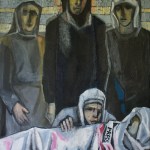
The works are on view as part of an ongoing exhibition at the Sharjah Art Museum
Alexandra ChavesJul 8, 2021, The National
Barjeel Art Foundation in Sharjah has acquired more than 30 artworks to its collection, a number of which have been added to an ongoing exhibition at the Sharjah Art Museum.
The new additions include an untitled work by Algerian artist Djamila Bent Mohamed, which features four female subjects with painted faces – blue eyelids and rouge lips – seemingly in discussion. Created in the 1970s, the work is currently being restored at the foundation.
Bent Mohamed had a revolutionary past. Born in 1933, she fought in the Algerian War of Independence, which began in the mid-1950s, and was imprisoned and tortured by the colonial French army. She went on to study art in Paris after the revolution, before returning to teach in Oran.
Another acquisition features a woman in a different setting and mood. Iraqi artist Widad Orfali’s 1963 work Woman shows a bereft female figure, rendered in angular forms, with her hands clasping her head. The figure of a man stands above her.
Orfali was born in Baghdad in 1929. After studying in Lebanon, she travelled across Europe and the region. In the 1960s, she had exhibited her work in cities such as Bonn and Washington, DC.
Also new to the Barjeel collection is Hakim Al Akel’s The Symbolic History of Arab Joy (Arabia Felix), a work from 1994. It is not the first work by Al Akel obtained by the foundation, which has displayed his works alongside fellow Yemeni artists Fouad Al Futaih and Amna Al-Nasiri previously.

Sultan Sooud Al Qassemi told The National about the importance of the latest acquisition, which was Al Akel’s university graduation project from the Surikov Art Institute in Moscow, where he specialised in murals and completed his studies in 1997.
“Al Akel’s work is particularly significant for the collection, as it presents a detailed visual account of Arab history through four eras – starting from BC, to pre-Islamic, Islamic, and the contemporary era,” he said.
Al Qassemi, along with his team at the foundation, selects the works for the collection in a variety of ways, purchasing through galleries, auctions or directly from the artist.Read moreBarjeel Art Foundation launches Mudun Short Story PrizeNew Barjeel display promotes parity with equal split of artworks by men and women
In the case of Beirut-born Nadia Saikali’s painting, for example, Al Qassemi decided on acquiring her work after a visit to her artist’s studio in Paris. “In the fall of 2020, I visited Lebanese artist Nadia Saikali in her beautiful studio in Montmartre, Paris, where I was struck by her work,” he recalled.
“Nadia, who practised ballet as a young woman, told me ‘Abstraction is like dancing on the canvas.’ We then went on to acquire two of her works from auction, as well as one from a gallery in France,” he explained.
Currently, the foundation has dedicated a room at the Sharjah Art Museum for Saikali’s work.

Another highlight is a 1961 work by Palestinian artist Abed Abdi titled Refugees, a muted painting of displaced figures trekking across a grey landscape. Born in Haifa, Abdi also works in graphic design and sculpture, though he is most known for his depictions of the Palestinian occupation.
In 1962, Abdi exhibited his work in the 1948 territories, making him the first Palestinian artist to do so before Israeli forces occupied the country in the 1967 Arab-Israeli War. Two years later, in 1964, he travelled to Germany to study at the Academy of Fine Arts in Dresden.
Barjeel’s latest list of acquisitions also includes works by Fatma Arargi, Suad Al-Attar, Afifa Aleiby, Nasir Chaura, Adham Ismail, Mahmoud Daadouch, Hussein Shariffe, Zaha Hadid, Fouad Al Foutaih, Amna Al-Nasiri, Nabil Kanso, Fateh Moudarres, Choukri Mesli and Mohamed Kacimi, among others.
A selection of works have been added to the current exhibition titled Memory Sews Together Events That Hadn’t Previously Met, which looks at the sociopolitical events of the 20th century through the eyes and artworks of Arab artists. The foundation calls it a “gender-balanced” exhibition, which continues Al Qassemi’s pledge to build a collection that was equally representative of male and female artists.
The show includes more than 130 works by artists from the Arab world, as well as countries in North Africa and West Asia. It will run at the Sharjah Art Museum until 2023, with new displays introduced regularly.
Updated: July 8th 2021, 7:03 AM



















